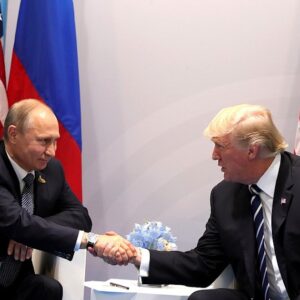Trump’s years in the White House have produced many books written by renowned American journalists ready to demonstrate the tycoon’s collusion with Russia. This week, American Kompromat: How the KGB Cultivated Donald Trump, and Related Tales of Sex, Greed, Power, and Treachery by Craig Unger, has joined these ranks, promising to reveal the ex-President’s relations with the KGB.

To get to the bottom of the spy story Unger draws on the account of Yuri Shvets, an ex-Major of the KGB working undercover as a Tass Agency correspondent in Washington D.C. in the 1980s.
Shvets, who now lives in Virginia and obtained American citizenship after the fall of the Soviet Union, was interviewed by The Guardian, releasing incendiary declarations.
“This is an example where people were recruited when they were just students and then they rose to important positions; something like that was happening with Trump,” he explained in an emblematic way before starting the actual story.
According to Shvets, Trump was targeted by the KGB when he married his first wife, the Czech citizen Ivana Zelnickova. First contact, however, occurred in 1980 when the tycoon opened the Grand Hyatt hotel in New York. Trump bought the 200 television sets necessary for the hotel rooms from Joy-Lud, whose co-owner was Semyon Kislin.
Still according to the ex-Russian spy’s account, Joy-Lud was controlled by the KGB, and Kislin operated as a “spotter agent” seeking out personalities that could be manipulated and recruited.

At that point in 1987, Donald and Ivana flew for the first time to Moscow and St. Petersburg where they met KGB agents who suggested to him that he go into politics.
For Shvets, interviewed by The Guardian, “The feeling was that he was extremely vulnerable intellectually, and psychologically, and he was prone to flattery.”
The former Russian spy goes on to explain in his book how easily Trump became a Russian asset: “[Trump] isn’t particularly complicated, since his dominant traits are low intelligence along with outsized vanity. This combination makes him a recruiter’s dream.”

Slave to his own ego and the flattery they had heaped on him, once back in the US Trump started to think of a political career. He tested the waters to evaluate the possibility of entering the Republican primary election and was extremely critical of Reagan’s foreign policy. Then, as now, the tycoon reproached the government for having acted as a shield, with its own money, to all those nations that refused to invest in defense and admitted to being particularly skeptical about NATO. According to Shvets, in Russia they couldn’t believe their own ears and were jubilant over the result of their “active measures” in the manipulation of their American “asset.” His ascent to the White House in 2016 turned out to be even more astounding.
In an article in the Washington Post John Sipher, an ex-CIA agent, confirms Donald Trump’s involvement with foreign powers, branding it a danger to national security. Nevertheless, in a review of American Kompromat Sipher casts doubt on the credibility of Yuri Shvets, who no longer serving in the KGB since the 90’s, would have had no way of knowing the depth of the relationship between Donald Trump and the Russian intelligence services after the dissolution of the KGB and the 2016 election.
The ex-CIA agent concludes, “we know that Trump was compromised, but we don’t know exactly how,” proving that despite the Mueller investigation and the many journalists who have opened Pandora’s box, many details still remain obscure, frequently feeding half truths and fantasies. But the truth remains out there.
Translated by Grace Russo Bullaro












